Are you ready to change your kitchen countertops in 2024? As kitchen design continues to evolve, choosing the right countertop material is more important than ever. After all, the kitchen is not only a place to cook, but also the center of family life. And a perfect kitchen design needs to consider not only aesthetics, but also practicality, durability, and ease of cleaning.
Whether you are renovating an old kitchen or creating an ideal cooking space for a new house, the choice of countertop material will affect the function and appearance of the entire kitchen. This "Ultimate Guide to Kitchen Countertop Materials 2024" will give you a detailed introduction to the Pros and Cons of various countertop materials to help you find the best choice for your kitchen.
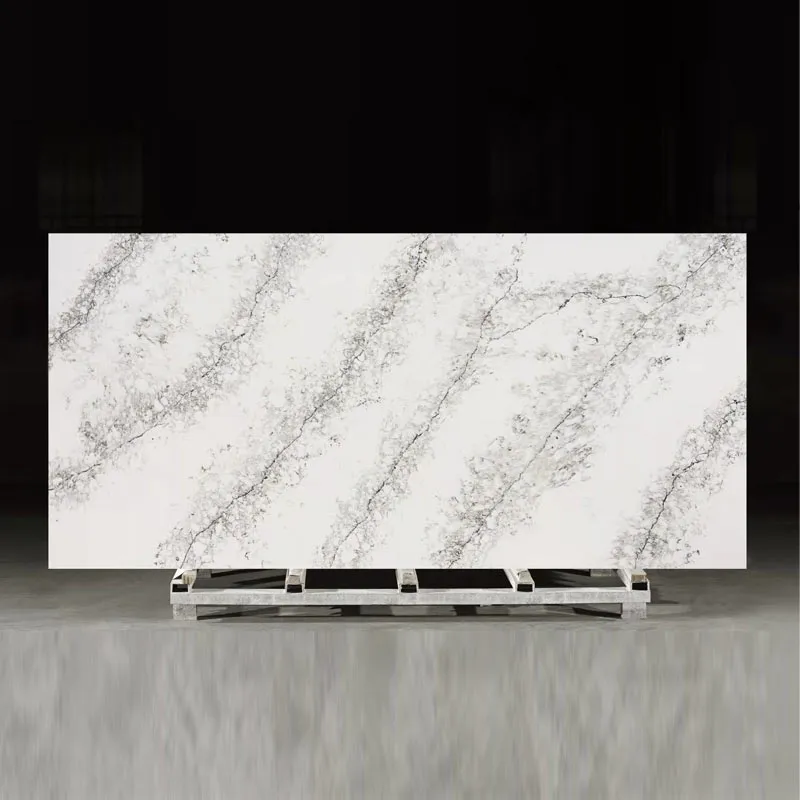
What is the Best Material for Kitchen Countertops?
When discussing the best material for kitchen countertops, the first thing to be clear is that "best" is a relative concept, which depends on your needs, budget, and personal preferences. For some people, appearance and texture may be the most important; while for others, durability and easy cleaning are key. Therefore, we cannot simply say that a certain material is "best", but we can find the most suitable material according to different needs.
From an aesthetic point of view, natural stones such as marble and granite have always been the first choice for kitchen design. Their unique texture and luxurious feel add extraordinary beauty to the kitchen. But if you focus on practicality and durability, quartz and laminate may be better choices. Quartz has extremely high hardness, stain resistance and easy maintenance, while laminate is popular for its rich color options and affordable prices.
In addition, environmental protection is also an important factor that more and more families consider when choosing countertop materials. Materials such as bamboo, recycled glass and sustainable wood excel in both environmental friendliness and unique style.
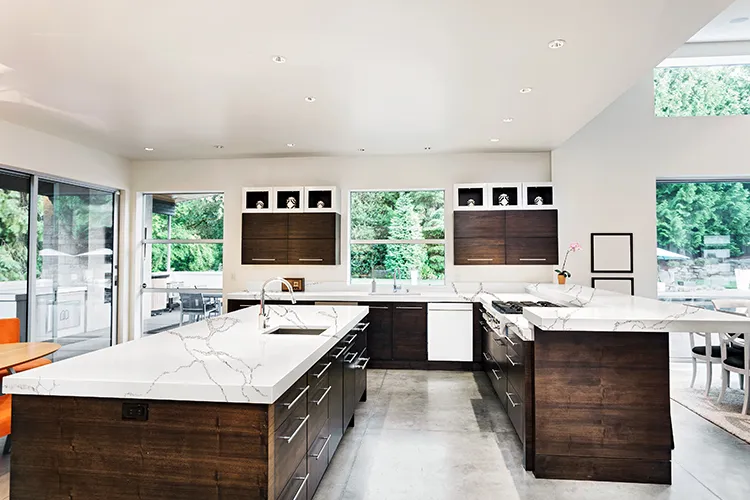
What are the Different Types of Kitchen Countertop Materials?
There are many different types of materials you can use for your countertops. In the past few years, granite and quartz have been the most popular. The natural texture of granite makes each granite countertop unique. Quartz countertops are easier to maintain than natural stones and offer a rich selection of colors. Marble tops the list for its timeless appearance. There are many types of kitchen countertop materials, each with its Pros and Cons. Here are some common kitchen countertop materials and their characteristics:
1. Marble - Marble is known for its elegant texture and luxurious appearance and is often used in high-end kitchen designs. It is heat-resistant, but easily corroded by acidic substances and scratches easily.
2. Granite - Granite is another high-end stone that is popular because it is hard and scratch-resistant. Its natural texture makes each granite countertop unique, but it is heavy and expensive to install.
3. Quartz - Quartz is a composite material made of natural quartz combined with resin. It has a very high hardness and stain resistance. It is easier to maintain than natural stone and is available in a wide range of colors.
4. Laminate - Laminate is an affordable countertop material that is made of multiple layers of paper and resin pressed together and covered with a plastic layer. It comes in a variety of colors and is easy to install, but it is not resistant to heat and scratches.
5. Solid wood - Solid wood countertops give the kitchen a warm feeling and are suitable for traditional or country-style kitchens. Although solid wood surfaces require regular waxing and sealing, their natural texture and environmentally friendly properties still attract many people.
6. Stainless steel - Stainless steel countertops are commonly found in industrial and modern kitchens. It is heat-resistant, stain-resistant and easy to clean, but it is prone to fingerprints and scratches.
7. Concrete - Concrete countertops can be customized to suit user needs and provide a seamless, modern look. It is very durable, but is prone to cracks and stains if not properly sealed.
8. Bamboo - Bamboo is a sustainable and environmentally friendly material with a strong texture and unique appearance. Although bamboo is not as durable as stone, it is equally suitable for kitchen countertops after proper treatment.
9. Recycled glass - Recycled glass countertops are made from recycled glass fragments and resins, which are environmentally friendly and modern. It comes in a variety of colors and is easy to clean, but it is relatively fragile.
10. Ceramic tile - Ceramic tile countertops are heat-resistant, stain-resistant and affordable. Although the tiles themselves are easy to clean, dirt tends to accumulate in the seams and requires regular maintenance.
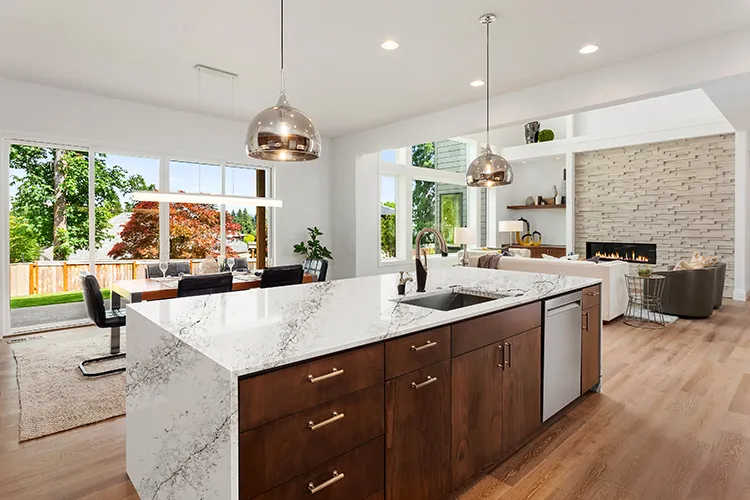
Compare Kitchen Countertop Materials to Choose the Best
To help you make an informed decision, we can compare different kitchen countertop materials from multiple dimensions, such as durability, ease of cleaning, heat resistance, price, and aesthetics.
| Materials | Durability | Cleanability | Heat resistance | Price | Aesthetics | Other features |
| Marble | Medium | Medium | High | High | High | Luxury |
| Granite | High | High | High | High | High | Unique texture |
| Quartz | High | High | Medium | Medium-high | High | Various colors |
| Laminate | Low | High | Low | Low | Medium | Affordable |
| Solid wood | Medium | Medium | Low | Medium-high | High | Warm texture |
| Stainless steel | High | High | High | Medium-high | High | Modern |
| Concrete | High | Medium | High | Medium-high | High | Customization |
| Bamboo | Medium | Medium | Low | Medium | Medium-high | Environmentally friendly materials |
| Recycled glass | Medium | High | Low | Medium-high | Medium-high | Environmentally friendly and modern |
| Ceramic tile | High | Medium | High | Low | Medium | Various patterns |
Marble Pros and Cons
Marble Pros:
● Elegant appearance: Marble has unique textures and natural color changes, giving the kitchen a noble and luxurious feel.
● Good heat resistance: Suitable for baking and other cooking tasks that require high temperatures.
● High-quality texture: Delicate touch and soft visual effect.
Marble Cons:
● Easy to stain: Marble is a porous material that easily absorbs liquids, making stains (such as red wine, lemon juice) difficult to remove.
● Easy to scratch: Relatively soft, it is easily scratched by sharp objects.
● High maintenance cost: Regular sealing treatment is required to maintain the appearance, and the maintenance cost is high.
Granite Pros and Cons
Granite Pros:
● Strong and durable: Very hard and scratch-resistant, able to withstand the wear and tear of daily kitchen use.
● Strong heat resistance: hot pots can be placed directly on the countertop without damaging the countertop.
● Unique texture: each piece of granite is unique, providing a wide range of color and texture options.
Granite Cons:
● Heavy weight: additional structural support may be required during installation, increasing installation costs.
● Higher price: Although durable, the initial purchase and installation costs are higher.
● Need to be sealed regularly: Although not as porous as marble, granite still needs to be sealed regularly to prevent stains.
Quartz Pros and Cons
Quartz Pros:
● Highly durable: Quartz is made of natural quartz and resin, which is very strong and resistant to scratches and stains.
● Low maintenance: no need for regular sealing, the surface is not easily stained or corroded, and it is easy to clean.
● Rich color selection: Because it is a man-made material, quartz can be made into a variety of colors and patterns, suitable for kitchens of different styles.
Quartz Cons:
● Higher price: Although relatively cheap compared to marble and granite, it is still more expensive than other materials.
● Not heat resistant: prolonged exposure to high temperatures may cause the countertop to discolor or become damaged, requiring the use of heat-insulating pads.
● Obvious seams: When used over a large area, the seams may be more obvious.
Laminate Pros and Cons
Laminate Pros:
● Affordable: Inexpensive, suitable for families with limited budgets.
● A variety of colors and textures: A variety of design options are available, including imitation wood, imitation stone textures, etc.
● Easy to install: Lightweight, easy to install, and can be quickly replaced.
Laminate Cons:
● Poor durability: Easy to be scratched and worn, not suitable for kitchens with high frequency of use.
● Not heat resistant: Cannot place hot pots directly, which can easily cause the surface to bulge or become damaged.
● Difficult to repair: Once the surface is damaged, it is difficult to repair, and the entire countertop usually needs to be replaced.
Solid Wood Pros and Cons
Solid Wood Pros:
● Natural and warm appearance: Wood countertops add warmth and texture to the kitchen, suitable for traditional or country styles.
● Highly repairable: Surface scratches and stains can be repaired by sanding and re-oiling to extend the service life.
● Environmentally friendly materials: If you choose wood from sustainable sources, it is an environmentally friendly choice.
Solid wood Cons:
● Requires regular maintenance: Solid wood countertops need to be waxed and oiled regularly to prevent moisture and stains from penetrating.
● Easily damaged: Not heat-resistant, not scratch-resistant, and easily affected by moisture and liquids.
● May deform: In a humid or dry environment, wood may expand or contract, causing deformation.
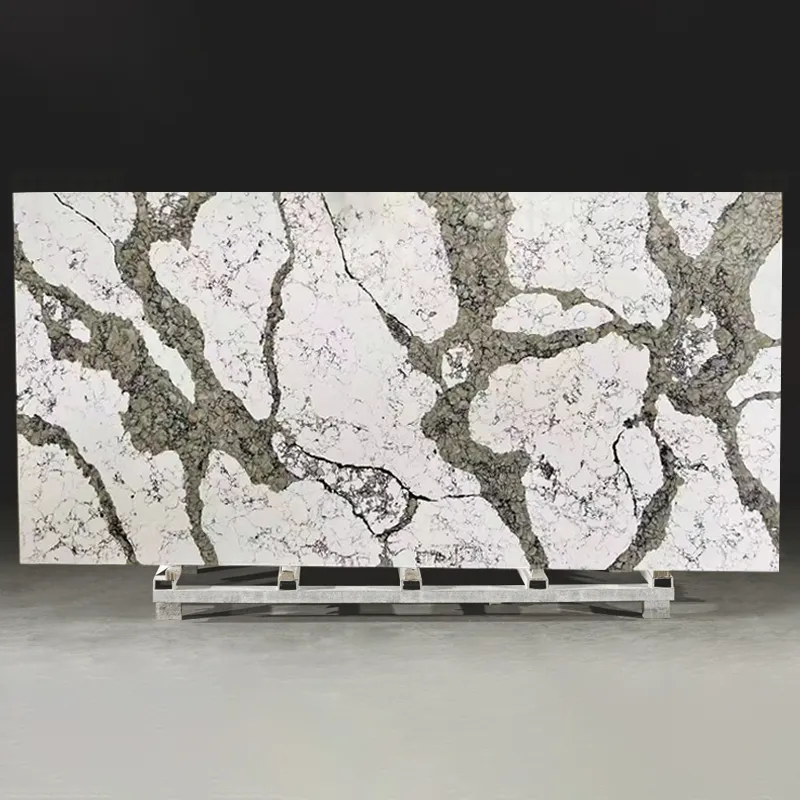
Stainless steel Pros and Cons
Stainless steel Pros:
● Extremely durable: High temperature resistance, scratch resistance, and strong antibacterial properties make it ideal for commercial kitchens or modern home kitchens.
● Easy to clean: The smooth surface is easy to clean and will hardly be stained or corroded.
● Strong modern feel: Suitable for industrial or modern kitchen designs, with a stylish appearance.
Stainless steel Cons:
● Easy to leave fingerprints and scratches: Although durable, the surface is prone to scratches and fingerprints, and needs to be wiped frequently to keep it smooth.
● Higher price: High-quality stainless steel countertops are expensive, and custom installation is costly.
● Lack of color options: The monotonous appearance, usually only metallic tones, is not suitable for users who like a variety of colors.
Concrete Pros and Cons
Concrete Pros:
● Highly customizable: It can be customized according to the specific requirements of the kitchen, providing a seamless and unique design.
● Good durability: Strong and durable, able to withstand heavy objects and high temperatures.
● Modern industrial style: Suitable for kitchen designs that pursue uniqueness and modernity.
Concrete Cons:
● Easy to crack: If not properly sealed, concrete countertops are prone to cracks, affecting their appearance and use.
● Requires regular sealing: Concrete is a porous material and needs to be sealed regularly to prevent stains and moisture from penetrating.
● Heavy weight: The load-bearing capacity of the foundation needs to be considered during installation, and additional structural support may be required.
Bamboo Pros and Cons
Bamboo Pros:
● Environmentally friendly material: Bamboo grows quickly and is a sustainable choice for environmentally conscious families.
● Unique appearance: Bamboo has natural texture and color, adding warmth and natural feeling to the kitchen.
● Lightweight: Compared with stone and concrete, bamboo is lighter and easier to install.
Bamboo Cons:
● Poor durability: Not as durable as other materials, easily affected by scratches, dents and moisture.
● Requires regular maintenance: Needs to be oiled or sealed regularly to prevent stains and moisture intrusion.
● Not heat-resistant: Not suitable for directly placing high-temperature items, otherwise it may cause damage to the countertop.
Recycled Glass Pros and Cons
Recycled Glass Pros:
● Strong environmental protection: Made of recycled glass, it is a sustainable and environmentally friendly choice.
● Rich colors: It can be manufactured in a variety of colors and textures, with flexible designs, suitable for modern style kitchens.
● Easy to clean: The surface is smooth, not easy to absorb stains, and simple to clean.
Recycled Glass Cons:
● Relatively fragile: Although it is hard, it is easy to break, especially when subjected to strong impact.
● Higher price: Due to the complex production process, recycled glass countertops are usually more expensive.
● Obvious joints: When used over a large area, the joints may be more obvious, affecting the overall appearance.
Ceramic tile Pros and Cons
Ceramic tile Pros:
● Strong heat resistance: Ceramic tiles are resistant to high temperatures and are suitable for placing hot pots and hot plates.
● Affordable: Compared with other materials, ceramic tile countertops are cheaper and can be flexibly selected according to budget.
● Diverse designs: There are various colors, shapes and patterns, which can be freely matched to meet personalized design needs.
Ceramic tile Cons:
● Difficult to clean joints: Dirt and mold are easily accumulated at the joints of ceramic tiles, and regular cleaning and maintenance are required.
● Uneven surface: Ceramic tile countertops are not as smooth as overall countertops, which may be inconvenient for operations such as cutting vegetables.
● Fragile: Ceramic tiles are brittle and are prone to cracking or edge collapse when hit by heavy objects.
Through the above comparison, we can see that each material has its own advantages and disadvantages in different dimensions. Which material to choose ultimately depends on your specific needs and budget.
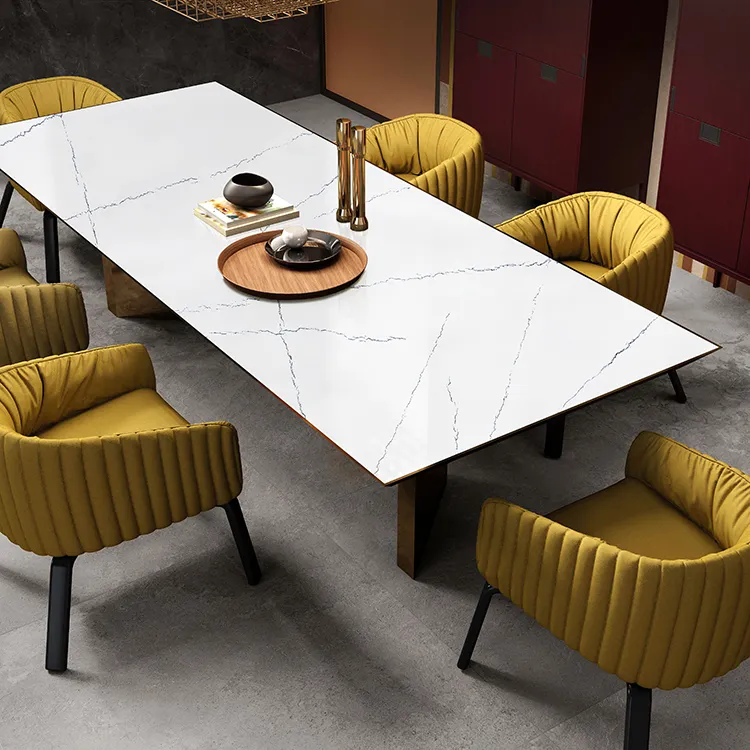
What are the Most Durable Kitchen Countertop Materials?
When it comes to durability, granite and quartz are two options that can't be ignored. Granite, as a natural stone, is very hard, scratch-resistant and heat-resistant, and can withstand the challenges of daily cooking. Quartz, due to its composite properties, has the same excellent durability and performs better in terms of stain and scratch resistance. However, to keep the countertops looking like new, be careful with acidic liquids, red wine and dark juices, avoid using harsh cleaners, and seal natural stone countertops at least once a year and clean up any spills promptly.
Secondly, heat resistance is another key consideration when deciding what material to use for kitchen countertops. Heat-resistant materials include granite and other natural stones, quartz, copper, terrazzo, stainless steel, aluminum and concrete. Countertops made of these materials can withstand high temperatures and resist the heat of hot pots and pans. But no matter the countertop material, it's best to treat it with care and use a trivet to hold hot pots and pans to protect the countertop from damage.
What is the Best Countertop Material that Won't Stain?
When searching for the best countertop material for your kitchen renovation, one important fact to note is that no countertop material is 100% stain-resistant. However, for those who want to reduce the burden of cleaning, quartz may be the best choice. Due to its non-porous structure, quartz countertops absorb almost no liquids, making them very stain-resistant. Whether it is coffee, red wine, or grease, it will not easily leave marks on the surface of quartz.
Another material worth recommending is stainless steel. It has a smooth, non-porous surface that does not easily absorb stains, making it very easy to clean. However, water stains and fingerprints easily leave marks on the surface of stainless steel, so it may need to be wiped frequently to keep it shiny.
What is the Easiest Countertop Material to Clean?
When it comes to easy cleaning, quartz and stainless steel still excel. Quartz, in particular, requires almost no maintenance. Due to its non-porous structure, quartz can remove most stains by gently wiping with warm water and a neutral detergent. Stainless steel can be easily wiped with a damp cloth to keep it shiny and new.
Glass countertops are also another easy-to-clean option. The glass surface is smooth and stains cannot penetrate. Just wipe it gently with glass cleaner or soapy water. However, glass countertops are prone to water stains and fingerprints and need to be taken care of frequently.
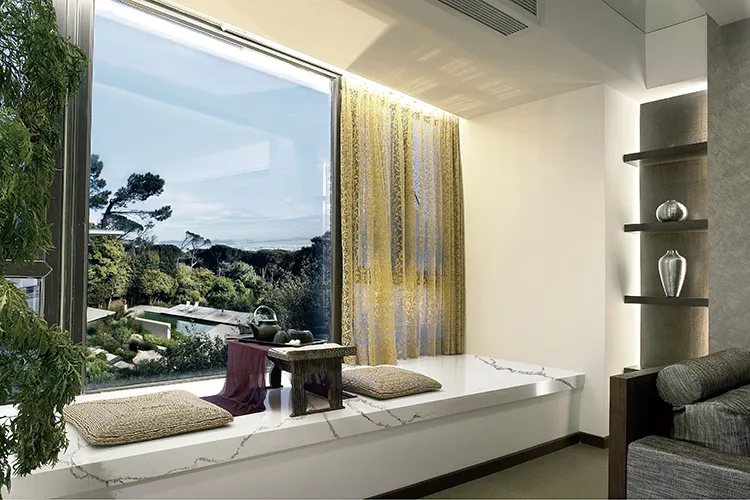
What is the Most Heat-Resistant Kitchen Countertop Material?
For those who often deal with high-temperature cooking in the kitchen, granite and stainless steel are undoubtedly the best choices. Granite, as a natural stone, can withstand extremely high temperatures without damage, so you can put hot pots directly on the granite countertop without worrying about damage. Similarly, stainless steel is also very heat-resistant and is the first choice for commercial kitchens.
Although quartz has high heat resistance, due to its composite material characteristics, long-term exposure to extremely high temperatures may cause the material to discolor or damage, so it is recommended to use insulation pads to protect the countertop.
Which Kitchen Countertop Material is the Most Cost-Effective?
If you are looking for cost-effective kitchen countertop materials, laminate and tile are two very affordable options. Laminate is not only inexpensive, but also offers a variety of color and pattern options, which is suitable for families with limited budgets. Although tile countertops require certain laying techniques, their durability and easy maintenance make them a very cost-effective choice.
Quartz is also considered a cost-effective material, and despite its higher initial cost, it is well worth the investment in the long run due to its excellent durability and low maintenance requirements. But no matter what you choose from the two, you will find that your choice is worth the money you spend on it.
Which Kitchen Countertop Material Offers the Widest Range of Color Options?
Quartz countertops are undoubtedly the most abundant in terms of color options. Due to its artificial synthetic nature, quartz can be manufactured in almost any color, from classic white and black to bright red and blue, to meet various design needs. Laminate also offers a variety of color and texture options, including wood grain, stone grain and metal effects, suitable for families pursuing personalized design.
In addition, granite countertops also have the widest range of color options. This is because each piece of granite is a product of nature, which means that each granite slab is unique.
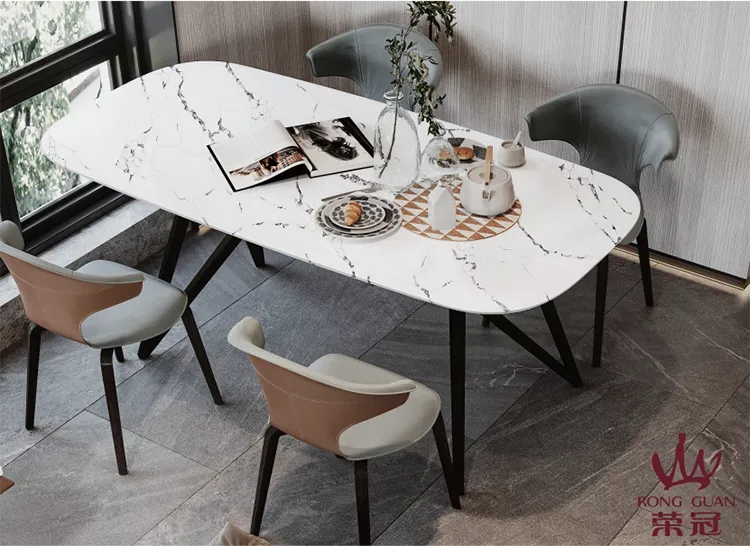
Can You Mix Countertop Materials in the Kitchen?
Yes, mixing countertops with different materials is becoming more and more popular in modern kitchen design. By using different materials in different work areas, you can make the most of the Pros of each material. For example, you can use heat-resistant granite or stainless steel countertops in cooking areas, while warmer wood or quartz is used in food preparation or social areas.
This combination not only increases the functionality of the kitchen, but also creates a unique visual effect that makes the kitchen more personal.
How Long Should Kitchen Countertops Last?
Different kitchen countertop materials have different lifespans. High-end materials such as granite and quartz can often last more than 20 years, or even longer. Natural stone countertops such as granite may need to be sealed regularly to maintain their appearance and integrity. Stainless steel countertops also have a very long lifespan in commercial kitchens and can withstand frequent use and high temperatures.
Materials such as laminate and solid wood have a relatively shorter lifespan, usually between 10 and 15 years, but can still provide a durable and cost-effective option for kitchen renovations. It depends on maintenance and frequency of use.
How Often Should You Replace Kitchen Countertops?
How often you should replace your kitchen countertops depends mainly on the durability of the material and your aesthetic preferences. If you use a durable material such as granite or quartz and are happy with the existing design, you may not need to replace it for 20 years or even longer. However, if countertops begin to show noticeable wear, scratches, cracks, or you're tired of the design of your kitchen, replacing them may be a good option. For materials such as laminate or solid wood, it's common to replace them every 10 to 15 years.
In addition, changes in design trends or lifestyle preferences may prompt homeowners to update their countertops more frequently. Ultimately, there's no set time frame for replacing kitchen countertops, but regularly evaluating their condition and functionality can help determine when a replacement is necessary.
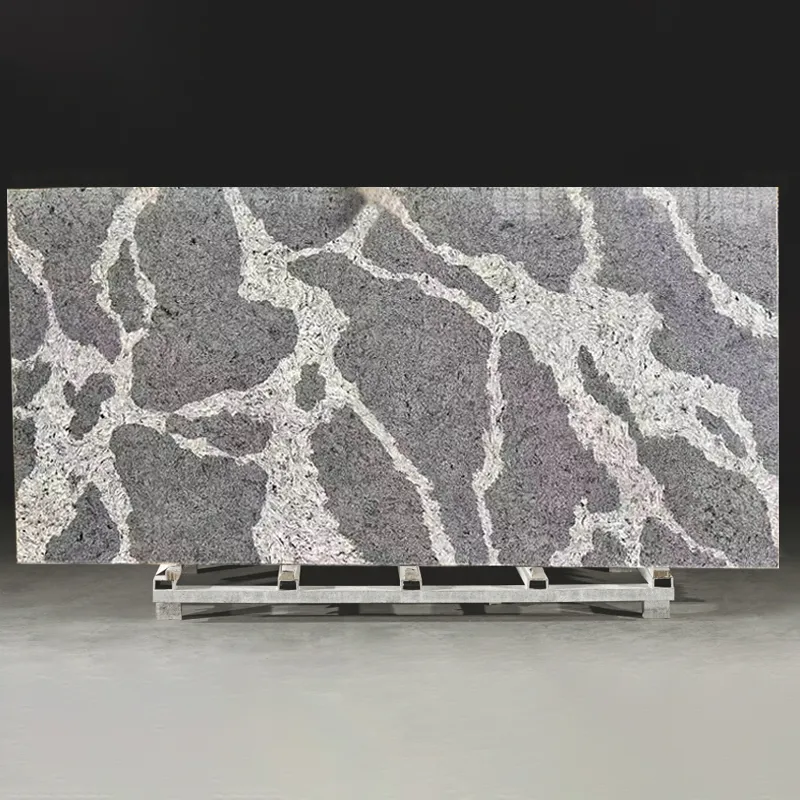
Summary of Kitchen Countertop Materials
When it comes to choosing a kitchen countertop material, there's no "one size fits all" answer. Each material has its own unique Pros and Cons that suit different needs and budgets. With this guide, I hope you'll have a clearer understanding of the characteristics of each material and make the choice that best suits your home and lifestyle.
Whatever material you ultimately choose, remember that the kitchen is an important part of family life, and choosing a countertop that's both beautiful and functional will bring more convenience and pleasure to your daily life.

